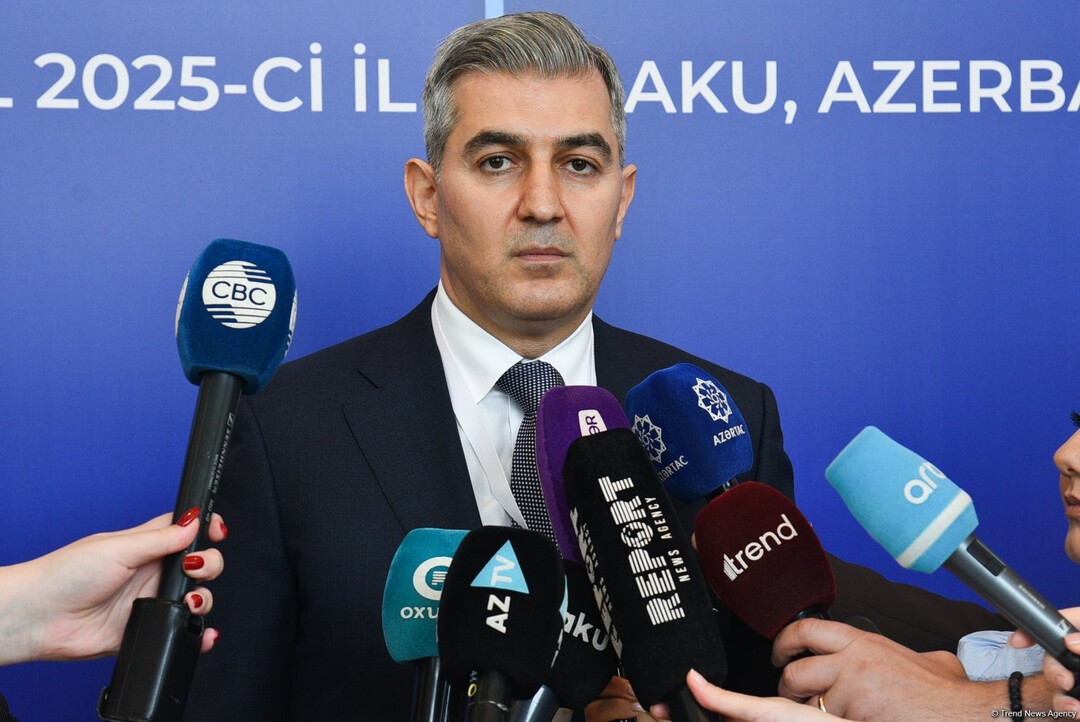
Baku, Azerbaijan – The future priorities of the Almaty Process, a cooperation platform for discussing refugee protection and international migration issues in the Central Asian region, were extensively discussed at the Third Almaty Process Ministerial Conference held in Baku today, according to Vusal Huseynov, Deputy Chief of the State Migration Service of Azerbaijan.
Deputy Chief Huseynov emphasized, "The Almaty Process aims to deepen cooperation in the field of migration, protect the rights of refugees in conflict areas, promote legal migration, and strengthen interaction between relevant government agencies."
Referring to Azerbaijan's achievements during its two-year chairmanship of the Almaty Process, he explained, "Today's meeting addresses three key areas: reviewing the progress of the Almaty Process and the outcomes of Azerbaijan's chairmanship over the past two years, the transfer of the chairmanship to Kazakhstan, and setting future priorities."
Particularly highlighting the importance of the adoption of the 'Baku Declaration' initiated by Azerbaijan, Deputy Chief Huseynov added, "This declaration presents the main areas in which the participating countries of the Almaty Process will focus their cooperation in the future."
The Almaty Process is a regional consultative process aimed at seeking joint responses to various issues arising from mixed migration flows within the Central Asian region and strengthening regional cooperation and coordination related to mixed migration. This Baku Ministerial Conference is expected to be an important opportunity to reaffirm these goals and set the future direction of the Almaty Process.
Background and Key Objectives of the Almaty Process
The Almaty Process, initiated by Kazakhstan in 2011, is a regional consultative forum aimed at enhancing cooperation among Central Asian countries on international migration and refugee protection. Due to its geographical characteristics, the region frequently experiences various forms of migration and refugee flows, leading to a continuous need for joint responses. Against this backdrop, the Almaty Process seeks to contribute to resolving migration and refugee-related issues within the region through information sharing, policy coordination, and capacity building among member states.
The main objectives can be summarized as follows:
Strengthening Migration Management Cooperation: Supporting the establishment of effective migration management systems through the sharing of migration-related information and experiences and the development of joint policies among member states.
Protecting the Rights of Refugees and Persons in Need of Protection: Strengthening cooperation to respect and protect the rights of refugees and persons in need of protection in accordance with international refugee conventions and related international norms.
Preventing Irregular Migration and Human Trafficking: Establishing joint efforts and information-sharing mechanisms to eradicate irregular migration and human trafficking, and enhancing cooperation to protect victims.
Promoting Legal Migration: Expanding legal migration pathways, such as labor migration, and strengthening efforts to protect the rights of migrant workers.
Strengthening International Partnerships: Enhancing the efficiency of the Almaty Process and securing the support of the international community through cooperation with relevant international organizations and non-governmental organizations (NGOs).
Achievements of Azerbaijan's Chairmanship and the Significance of the 'Baku Declaration'
During its two-year chairmanship of the Almaty Process, Azerbaijan played a leading role in sharing its achievements at this conference and adopting the 'Baku Declaration', which will serve as an important foundation for future cooperation. Although the specific content of the 'Baku Declaration' has not yet been disclosed, judging from Deputy Chief Huseynov's remarks, it is expected to outline the key areas in which the participating countries of the Almaty Process should focus their cooperation in the future. This is likely to be an important document that further specifies the existing goals of the Almaty Process and proposes new directions for cooperation in line with the changing international migration environment.
Azerbaijan is recognized for actively leading discussions to resolve migration issues within the region and making various efforts to strengthen cooperation among member states during its chairmanship. The hosting of this Baku conference and the adoption of the 'Baku Declaration' can be seen as significant outcomes of these efforts.
Kazakhstan's New Chairmanship Role and Future Prospects
At this conference, the chairmanship of the Almaty Process is transferred to Kazakhstan, the founding country. Kazakhstan has actively participated in the Almaty Process since its inception and is expected to further strengthen cooperation for resolving migration and refugee issues within the region in its capacity as the new chair. Particularly considering the geopolitical importance of the Central Asian region and its diverse migration flows, Kazakhstan's leadership is expected to play a crucial role in the continued development and the achievement of tangible results by the Almaty Process.
In the future, the Almaty Process is expected to further deepen cooperation among member states based on the 'Baku Declaration' and strengthen partnerships with the international community to make practical contributions to resolving migration and refugee issues within the region. In particular, joint response efforts to various challenges such as mixed migration, irregular migration, and refugee protection are expected to be strengthened, which could positively impact the stability and development of the Central Asian region.
This Baku Ministerial Conference appears to be a significant turning point for the Almaty Process. Building on Azerbaijan's successful chairmanship, it remains to be seen whether the Almaty Process, under the leadership of the new chair Kazakhstan, will further develop and achieve practical results in resolving migration and refugee issues within the region.
[Copyright (c) Global Economic Times. All Rights Reserved.]






























